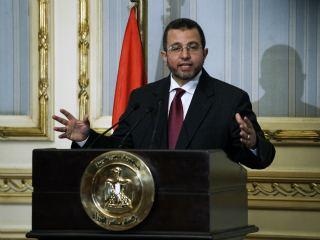
(File Photo) (AFP PHOTO)
By: Lamia Nabil
Prime Minster Hesham Qandil announced yesterday government plans to increase natural gas prices for cement and brick factories from $4 per million BTU to $6 per million BTU.
The government also decided to increase fuel oil and diesel prices by 50%, both of which are widely used in energy-intensive local industries, to reach EGP 1,500 ($220) per tonne, instead of EGP 1,000.
Minster of Petroleum Osama Kamal said that the decision to increase gas, fuel oil, and diesel prices for cement and brick factories came after an agreement with Minister of Industry and International Trade Hatem Saleh.
Kamal also said that a decision has been taken to improve energy price distortions for factories in order to ensure fair competition between them by applying uniform prices on thermal plants regardless of the type of fuel used.
This will raise natural gas prices to $6 per million BTU equivalent, and diesel and fuel oil prices to EGP 1,500 per tonne. Energy prices will thus become uniform for factories that belong to the same sector.
The Prime minister excluded all electricity production companies from the natural gas price increases, and also excluded bakeries and the food industry from fuel oil price increases; diesel and fuel oil prices for these companies and sectors will thus remain at EGP 1,000 per tonne.
Diesel prices will also be periodically reviewed for the next three years in order for the government to recoup production costs, with the new prices announced each year.
Managing Director of Beni Suef Cement Farouq Mostafa criticised the timing of the decision, claiming that it would increase the financial burden on companies during the current recession.
“The consumer is the ultimate victim,” he said, “because energy is an essential component in the production process for cement.”
He predicted that prices will increase at least EGP 60 after implementation of the resolution.
Mustafa also mentioned that the Industry Committee of the Shura Council held a meeting last week with cement companies to develop a plan to raise gas prices for factories. The meeting concluded that the price hikes would not be appropriate at the current time and that prices should be increased gradually.
Chair of the Department of Petroleum and Energy Engineering at the American University in Cairo (AUC) Professor Magdy Nasrallah, agreed with the decision.
Nasrallah accused foreign cement company’s who set up factories in Egypt of exploiting the country’s low energy and labour prices, something which, he said, is “unfair”, as these companies will then export a considerable amount of their production lines at international prices.
“The real question now,” he said, “is why would they obtain their energy needs via a significant subsidy?”
“This equation should have changed a long time ago,” he continued, “as these companies are very heavy users of energy resources and the country is losing a lot of money. We already have an energy shortage and this is the first year we have had to import natural gas.”
He added: “There must be some sort of regulation to organise local cement and brick prices in order to ensure that our local production lines won’t be affected, and that our products are sold at reasonable prices.”







